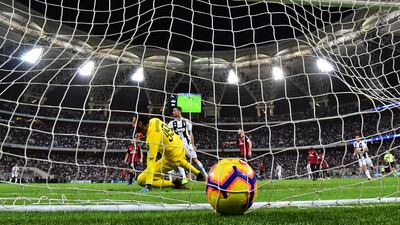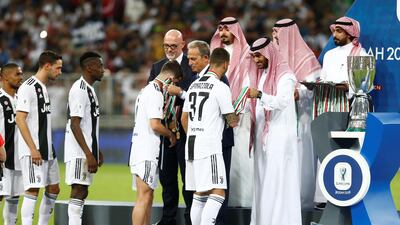Juventus beat AC Milan 1-0 in Saudi Arabia on Wednesday to win the Italian Super Cup for a record eighth time.
Cristiano Ronaldo scored the only goal of the match to win his first trophy with Juventus. It was his fourth goal in his past four matches.
Milan had to play the final 16 minutes with 10 men after midfielder Franck Kessie was sent off following a foul on Emre Can, which saw him stamp on the Juventus midfielder.
The match went ahead at a sold-out King Abdullah Sports City Stadium in Jeddah in front of more than 61,000 fans.
____________
Read more
Cristiano Ronaldo meets fans in Jeddah ahead of Italian Super Cup final with AC Milan - in pictures
AC Milan arrive in Jeddah ahead of Italian Super Cup final with Juventus
Aaron Ramsey to join Juventus in summer on £36 million five-year deal
____________
Last June, the Italian league announced it agreed to a deal with Saudi Arabia's General Sports Authority for three of the next five Super Cups to be played in the kingdom.
Gonzalo Higuain, who is on loan at Milan from Juventus, had also been a focus of the buildup to the match ahead of a potential move to Chelsea, but the Argentina forward was named on the bench against his parent club.
Blaise Matuidi had a goal for Juventus disallowed for offside while Ronaldo saw an acrobatic effort bounce narrowly over the crossbar in an even first half which also saw Juve goalkeeper Wojciech Szczesny pull off a good save to deny Hakan Calhanoglu.
Milan almost took the lead immediately after halftime but Patrick Cutrone's effort came off the crossbar.
The Rossoneri were left to rue that missed opportunity as Ronaldo broke the deadlock in the 61st minute.
Miralem Pjanic floated a ball over the top and Ronaldo headed it past Gianluigi Donnarumma.
Juventus had another goal disallowed for offside but any chance Milan had of getting back into the match all but evaporated after Kessie was sent off in the 74th.
Referee Luca Banti initially showed Kessie only a yellow card but changed it to a red after seeing the late tackle again on video review.













